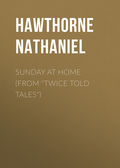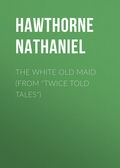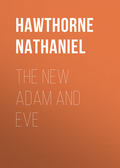
000
ОтложитьЧитал
LONDON. – MILTON-CLUB DINNER
April 4th, 1856. – On Tuesday I went to No. 14 Ludgate Hill, to dine with Bennoch at the Milton Club; a club recently founded for dissenters, nonconformists, and people whose ideas, religious or political, are not precisely in train with the establishment in church and state. I was shown into a large reading-room, well provided with periodicals and newspapers, and found two or three persons there; but Bennoch had not yet arrived. In a few moments, a tall gentleman with white hair came in, – a fine and intelligent-looking man, whom I guessed to be one of those who were to meet me. He walked about, glancing at the periodicals; and soon entered Mr. Tupper, and, without seeing me, exchanged warm greetings with the white-haired gentleman. "I suppose," began Mr. Tupper, "you have come to meet – " Now, conscious that my name was going to be spoken, and not knowing but the excellent Mr. Tupper might say something which he would not, quite like me to overhear, I advanced at once, with outstretched hand, and saluted him. He expressed great joy at the recognition, and immediately introduced me to Mr. Hall.
The dining-room was pretty large and lofty, and there were sixteen guests at table, most of them authors, or people connected with the press; so that the party represented a great deal of the working intellect of London at this present day and moment, – the men whose plays, whose songs, whose articles, are just now in vogue. Mr. Tom Taylor was one of the very few whose writings I had known anything about. He is a tall, slender, dark young man, not English-looking, and wearing colored spectacles, so that I should readily have taken him for an American literary man. I did not have much opportunity of talking with him, nor with anybody else, except Dr. – , who seemed a shrewd, sensible man, with a certain slight acerbity of thought. Mr. Herbert Ingram, recently elected member of Parliament, was likewise present, and sat on Bennoch's left.
It was a very good dinner, with an abundance of wine, which Bennoch sent round faster than was for the next day's comfort of his guests. It is singular that I should thus far have quite forgotten W – H – , whose books I know better than those of any other person there. He is a white-headed, stout, firm-looking, and rather wrinkled-faced old gentleman, whose temper, I should imagine, was not the very sweetest in the world. There is all abruptness, a kind of sub-acidity, if not bitterness, in his address; he seemed not to be, in short, so genial as I should have anticipated from his books.
As soon as the cloth was removed, Bennoch, without rising from his chair, made a speech in honor of his eminent and distinguished guest, which illustrious person happened to be sitting in the selfsame chair that I myself occupied. I have no recollection of what he said, nor of what I said in reply, but I remember that both of us were cheered and applauded much more than the occasion deserved. Then followed about fifty other speeches; for every single individual at table was called up (as Tupper said, "toasted and roasted"), and, for my part, I was done entirely brown (to continue T – 's figure). Everybody said something kind, not a word or idea of which can I find in my memory. Certainly, if I never get any more praise in my life, I have had enough of it for once. I made another little bit of a speech, too, in response to something that was said in reference to the present difficulties between England and America, and ended, as a proof that I deemed war impossible, with drinking success to the British army, and calling on Lieutenant Shaw, of the Aldershott Camp, to reply. I am afraid I must have said something very wrong, for the applause was vociferous, and I could hear the gentlemen whispering about the table, "Good!" "Good!" "Yes, he is a fine fellow," – and other such ill-earned praises; and I took shame to myself, and held my tongue (publicly) the rest of the evening. But in such cases something must be allowed to the excitement of the moment, and to the effect of kindness and goodwill, so broadly and warmly displayed; and even a sincere man must not be held to speak as if he were under oath.
We separated, in a blessed state of contentment with one another, at about eleven; and (lest I should starve before morning) I went with Mr. D – to take supper at his house in Park Lane. Mr. D – is a pale young gentleman, of American aspect, being a West-Indian by birth. He is one of the principal writers of editorials for the Times. We were accompanied in the carriage by another gentleman, Mr. M – , who is connected with the management of the same paper. He wrote the letters from Scutari, which drew so much attention to the state of the hospitals. Mr. D – is the husband of the former Miss – , the actress, and when we reached his house, we found that she had just come home from the theatre, and was taking off her stage-dress. Anon she came down to the drawing-room, – a seemingly good, simple, and intelligent lady, not at all pretty, and, I should think, older than her husband. She was very kind to me, and told me that she had read one of my books – The House of the Seven Gables – thirteen years ago; which I thought remarkable, because I did not write it till eight or nine years afterwards.
The principal talk during supper (which consisted of Welsh-rabbit and biscuits, with champagne and sodawater) was about the Times, and the two contributors expressed vast admiration of Mr. – , who has the chief editorial management of the paper. It is odd to find how little we outsiders know of men who really exercise a vast influence on affairs, for this Mr. – is certainly of far more importance in the world than a minister of state. He writes nothing himself; but the character of the Times seems to depend upon his intuitive, unerring judgment; and if ever he is absent from his post, even for a day or two, they say that the paper immediately shows it. In reply to my questions, they appeared to acknowledge that he was a man of expediency, but of a very high expediency, and that he gave the public the very best principles which it was capable of receiving. Perhaps it may be so: the Times's articles are certainly not written in so high a moral vein as might be wished; but what they lack in height they gain in breadth. Every sensible man in England finds his own best common-sense there; and, in effect, I think its influence is wholesome.
Apropos of public speaking, Dr. – said that Sir Lytton Bulwer asked him (I think the anecdote was personal to himself) whether he felt his heart beat when he was going to speak. "Yes." "Does your voice frighten you?" "Yes." "Do all your ideas forsake you?" "Yes." "Do you wish the floor to open and swallow you?" "Yes." "Why, then, you'll make an orator!" Dr. – told of Canning, too, how once, before rising to speak in the House of Commons, he bade his friend feel his pulse, which was throbbing terrifically. "I know I shall make one of my best speeches," said Canning, "because I'm in such an awful funk!" President Pierce, who has a great deal of oratorical power, is subject to a similar horror and reluctance.
REFORM-CLUB DINNER
April 5th. – On Thursday, at eight o'clock, I went to the Reform Club, to dine with Dr. – . The waiter admitted me into a great basement hall, with a tessellated or mosaic or somehow figured floor of stone, and lighted from a dome of lofty height. In a few minutes Dr. – appeared, and showed me about the edifice, which is very noble and of a substantial magnificence that was most satisfactory to behold, – no wood-work imitating better materials, but pillars and balustrades of marble, and everything what it purports to be. The reading-room is very large, and luxuriously comfortable, and contains an admirable library: there are rooms and conveniences for every possible purpose; and whatever material for enjoyment a bachelor may need, or ought to have, he can surely find it here, and on such reasonable terms that a small income will do as much for him as a far greater one on any other system.
In a colonnade, on the first floor, surrounding the great basement hall, there are portraits of distinguished reformers, and black niches for others yet to come. Joseph Hume, I believe, is destined to fill one of these blanks; but I remarked that the larger part of the portraits, already hung up, are of men of high rank, – the Duke of Sussex, for instance; Lord Durham, Lord Grey; and, indeed, I remember no commoner. In one room, I saw on the wall the fac-simile, so common in the United States, of our Declaration of Independence.
Descending again to the basement hall, an elderly gentleman came in, and was warmly welcomed by Dr. – . He was a very short man, but with breadth enough, and a back excessively bent, – bowed almost to deformity; very gray hair, and a face and expression of remarkable briskness and intelligence. His profile came out pretty boldly, and his eyes had the prominence that indicates, I believe, volubility of speech, nor did he fail to talk from the instant of his appearance; and in the tone of his voice, and in his glance, and in the whole man, there was something racy, – a flavor of the humorist. His step was that of an aged man, and he put his stick down very decidedly at every footfall; though as he afterwards told me that he was only fifty-two, he need not yet have been infirm. But perhaps he has had the gout; his feet, however, are by no means swollen, but unusually small. Dr. – introduced him as Mr. Douglas Jerrold, and we went into the coffee-room to dine.
The coffee-room occupies one whole side of the edifice, and is provided with a great many tables, calculated for three or four persons to dine at; and we sat down at one of these, and Dr. – ordered some mulligatawny soup, and a bottle of white French wine. The waiters in the coffee-room are very numerous, and most of them dressed in the livery of the Club, comprising plush breeches and white-silk stockings; for these English Reformers do not seem to include Republican simplicity of manners in their system. Neither, perhaps, is it anywise essential.
After the soup, we had turbot, and by and by a bottle of Chateau Margaux, very delectable; and then some lambs' feet, delicately done, and some cutlets of I know not what peculiar type; and finally a ptarmigan, which is of the same race of birds as the grouse, but feeds high up towards the summits of the Scotch mountains. Then some cheese, and a bottle of Chambertin. It was a very pleasant dinner, and my companions were both very agreeable men; both taking a shrewd, satirical, yet not ill-natured, view of life and people, and as for Mr. Douglas Jerrold, he often reminded me of E – C – , in the richer veins of the latter, both by his face and expression, and by a tincture of something at once wise and humorously absurd in what he said. But I think he has a kinder, more genial, wholesomer nature than E – , and under a very thin crust of outward acerbity I grew sensible of a very warm heart, and even of much simplicity of character in this man, born in London, and accustomed always to London life.
I wish I had any faculty whatever of remembering what people say; but, though I appreciate anything good at the moment, it never stays in my memory; nor do I think, in fact, that anything definite, rounded, pointed, separable, and transferable from the general lump of conversation was said by anybody. I recollect that they laughed at Mr. – , and at his shedding a tear into a Scottish river, on occasion of some literary festival… They spoke approvingly of Bulwer, as valuing his literary position, and holding himself one of the brotherhood of authors; and not so approvingly of Charles Dickens, who, born a plebeian, aspires to aristocratic society. But I said that it was easy to condescend, and that Bulwer knew he could not put off his rank, and that he would have all the advantages of it in spite of his authorship. We talked about the position of men of letters in England, and they said that the aristocracy hated and despised and feared them; and I asked why it was that literary men, having really so much power in their hands, were content to live unrecognized in the State.
Douglas Jerrold talked of Thackeray and his success in America, and said that he himself purposed going and had been invited thither to lecture. I asked him whether it was pleasant to a writer of plays to see them performed; and he said it was intolerable, the presentation of the author's idea being so imperfect; and Dr. – observed that it was excruciating to hear one of his own songs sung. Jerrold spoke of the Duke of Devonshire with great warmth, as a true, honest, simple, most kind-hearted man, from whom he himself had received great courtesies and kindnesses (not, as I understood, in the way of patronage or essential favors); and I (Heaven forgive me!) queried within myself whether this English reforming author would have been quite so sensible of the Duke's excellence if his Grace had not been a duke. But indeed, a nobleman, who is at the same time a true and whole-hearted man, feeling his brotherhood with men, does really deserve some credit for it.
In the course of the evening, Jerrold spoke with high appreciation of Emerson; and of Longfellow, whose Hiawatha he considered a wonderful performance; and of Lowell, whose Fable for Critics he especially admired. I mentioned Thoreau, and proposed to send his works to Dr. – , who, being connected with the Illustrated News, and otherwise a writer, might be inclined to draw attention to then. Douglas Jerrold asked why he should not have them too. I hesitated a little, but as he pressed me, and would have an answer, I said that I did not feel quite so sure of his kindly judgment on Thoreau's books; and it so chanced that I used the word "acrid" for lack of a better, in endeavoring to express my idea of Jerrold's way of looking at men and books. It was not quite what I meant; but, in fact, he often is acrid, and has written pages and volumes of acridity, though, no doubt, with an honest purpose, and from a manly disgust at the cant and humbug of the world. Jerrold said no more, and I went on talking with Dr. – ; but, in a minute or two, I became aware that something had gone wrong, and, looking at Douglas Jerrold, there was an expression of pain and emotion on his face. By this time a second bottle of Burgundy had been opened (Clos Vougeot, the best the Club could produce, and far richer than the Chambertin), and that warm and potent wine may have had something to do with the depth and vivacity of Mr. Jerrold's feelings. But he was indeed greatly hurt by that little word "acrid." "He knew," he said, "that the world considered him a sour, bitter, ill-natured man; but that such a man as I should have the sane opinion was almost more than he could bear." As he spoke, he threw out his arms, sank back in his seat, and I was really a little apprehensive of his actual dissolution into tears. Hereupon I spoke, as was good need, and though, as usual, I have forgotten everything I said, I am quite sure it was to the purpose, and went to this good fellow's heart, as it came warmly from my own. I do remember saying that I felt him to be as genial as the glass of Burgundy which I held in my hand; and I think that touched the very right spot; for he smiled, and said he was afraid the Burgundy was better than he, but yet he was comforted. Dr. – said that he likewise had a reputation for bitterness; and I assured him, if I might venture to join myself to the brotherhood of two such men, that I was considered a very ill-natured person by many people in my own country. Douglas Jerrold said he was glad of it.
We were now in sweetest harmony, and Jerrold spoke more than it would become me to repeat in praise of my own books, which he said he admired, and he found the man more admirable than his books! I hope so, certainly.
We now went to the Haymarket Theatre, where Douglas Jerrold is on the free list; and after seeing a ballet by some Spanish dancers, we separated, and betook ourselves to our several homes. I like Douglas Jerrold very much.
April 8th. – On Saturday evening, at ten o'clock, I went to a supper-party at Mr. D – 's, and there met five or six people, – Mr. Faed, a young and distinguished artist; Dr. Eliotson, a dark, sombre, taciturn, powerful-looking man, with coal-black hair, and a beard as black, fringing round his face; Mr. Charles Reade, author of Christie Johnstone and other novels, and many plays, – a tall man, more than thirty, fair-haired, and of agreeable talk and demeanor.
On April 6th, I went to the Waterloo station, and there meeting Bennoch and Dr. – , took the rail for Woking, where we found Mr. Hall's carriage waiting to convey us to Addlestone, about five miles off. On arriving we found that Mr. and Mrs. Hall had not yet returned from church. Their place is an exceedingly pretty one, and arranged in very good taste. The house is not large; but is filled, in every room, with fine engravings, statuettes, ingenious prettinesses or beautifulnesses in the way of flower-stands, cabinets, and things that seem to have bloomed naturally out of the characters of its occupants. There is a conservatory connected with the drawing-room, and enriched with lovely plants, one of which has a certain interest as being the plant on which Coleridge's eyes were fixed when he died. This conservatory is likewise beautified with several very fine casts of statues by modern sculptors, among which was the Greek Slave of Powers, which my English friends criticised as being too thin and meagre; but I defended it as in accordance with American ideas of feminine beauty. From the conservatory we passed into the garden, but did not minutely examine it, knowing that Mr. Hall would wish to lead us through it in person. So, in the mean time, we took a walk in the neighborhood, over stiles and along by-paths, for two or three miles, till we reached the old village of Chertsey. In one of its streets stands an ancient house, gabled, and with the second story projecting over the first, and bearing an inscription to the purport that the poet Cowley had once resided, and, I think, died there. Thence we passed on till we reached a bridge over the Thames, which at this point, about twenty-five miles from London, is a narrow river, but looks clean and pure, and unconscious what abominations the city sewers will pour into it anon. We were caught in two or three showers in the course of our walk; but got back to Firfield without being very much wetted.
Our host and hostess had by this time returned from church, and Mrs. Hall came frankly and heartily to the door to greet us, scolding us (kindly) for having got wet… I liked her simple, easy, gentle, quiet manners, and I liked her husband too.
He has a wide and quick sympathy, and expresses it freely… The world is the better for him.
The shower being now over, we went out upon the beautiful lawn before his house, where there were a good many trees of various kinds, many of which have been set out by persons of great or small distinction, and are labelled with their names. Thomas Moore's name was appended to one; Maria Edgeworth's to another; likewise Fredrika Bremer's, Jenny Lind's; also Grace Greenwood's, and I know not whose besides. This is really a pleasant method of enriching one's grounds with memorials of friends, nor is there any harm in making a shrubbery of celebrities. Three holes were already dug, and three new trees lay ready to be planted, and for me there was a sumach to plant, – a tree I never liked; but Mr. Hall said that they had tried to dig up a hawthorn, but found it clung too fast to the soil. So, since better might not be, and telling Mr. Hall that I supposed I should have a right to hang myself on this tree whenever I chose, I seized a spade, and speedily shovelled in a great deal of dirt; and there stands my sumach, an object of interest to posterity! Bennoch also and Dr. – set out their trees, and indeed, it was in some sense a joint affair, for the rest of the party held up each tree, while its godfather shovelled in the earth; but, after all, the gardener had more to do with it than we. After this important business was over, Mr. Hall led us about his rounds, which are very nicely planned and ordered; and all this he has bought, and built, and laid out, from the profits of his own and his wife's literary exertions.
We dined early, and had a very pleasant dinner, and, after the cloth was removed, Mr. Hall was graciously pleased to drink my health, following it with a long tribute to my genius. I answered briefly; and one half of my short speech was in all probability very foolish..
After the ladies (there were three, one being a girl of seventeen, with rich auburn hair, the adopted daughter of the Halls) had retired, Dr. – having been toasted himself, proposed Mrs. Hall's health.
I did not have a great deal of conversation with Mrs. Hall; but enough to make me think her a genuine and good woman, unspoilt by a literary career, and retaining more sentiment than even most girls keep beyond seventeen. She told me that it had been the dream of her life to see Longfellow and myself!.. Her dream is half accomplished now, and, as they say Longfellow is coming over this summer, the remainder may soon be rounded out. On taking leave, our kind hosts presented me with some beautiful flowers, and with three volumes of a work, by themselves, on Ireland; and Dr. – was favored also with some flowers, and a plant in a pot, and Bennoch too had his hands full… and we went on our way rejoicing.
[Here follows an account of the Lord Mayor's dinner, taken mostly for Our Old Home; but I think I will copy this more exact description of the lady mentioned in "Civic Banquets." – ED.]
… My eyes were mostly drawn to a young lady, who sat nearly opposite me, across the table. She was, I suppose, dark, and yet not dark, but rather seemed to be of pure white marble, yet not white; but the purest and finest complexion, without a shade of color in it, yet anything but sallow or sickly. Her hair was a wonderful deep raven-black, black as night, black as death; not raven-black, for that has a shiny gloss, and hers had not, but it was hair never to be painted nor described, – wonderful hair, Jewish hair. Her nose had a beautiful outline, though I could see that it was Jewish too; and that, and all her features, were so fine that sculpture seemed a despicable art beside her, and certainly my pen is good for nothing. If any likeness could be given, however; it must be by sculpture, not painting. She was slender and youthful, and yet had a stately and cold, though soft and womanly grace; and, looking at her, I saw what were the wives of the old patriarchs in their maiden or early-married days, – what Judith was, for, womanly as she looked, I doubt, not she could have slain a man in a just cause, – what Bathsheba was, only she seemed to have no sin in her, – perhaps what Eve was, though one could hardly think her weak enough to eat the apple… Whether owing to distinctness of race, my sense that she was a Jewess, or whatever else, I felt a sort of repugnance, simultaneously with my perception that she was an admirable creature.








